-
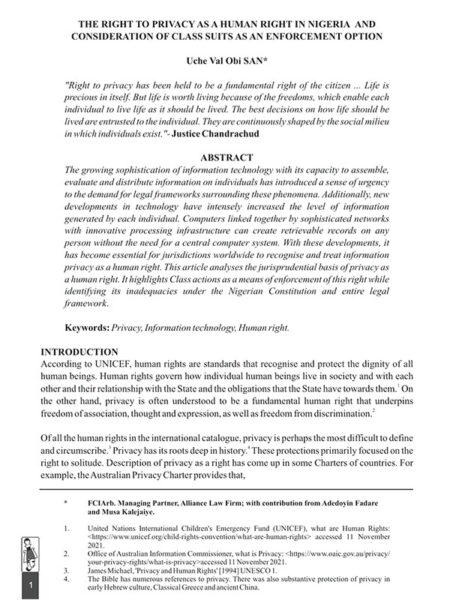
The Right to Privacy as a Human Right in Nigeria and Consideration of Class Suits as an Enforcement Option
0₦2,500.00Uche Val Obi SAN, Managing Partner, Alliance Law Firm, in his article, The Right to Privacy as a Human Right in Nigeria and Consideration of Class Suits as an Enforcement Option, notes that the growing sophistication of information technology with its capacity to assemble, evaluate and distribute information on individuals has introduced a sense of urgency to the demand for legal frameworks surrounding these phenomena. He argues that it has then become essential for jurisdictions worldwide to recognise and treat information privacy as a human right. Val Obi, SAN analyses the jurisprudential basis of privacy as a human right, constitutional and extant legislation on protecting and redressing privacy rights infringement in Nigeria. He highlights Class Action as a means of enforcement of privacy rights while identifying its inadequacies under the Nigerian Constitution and the entire legal framework.
-
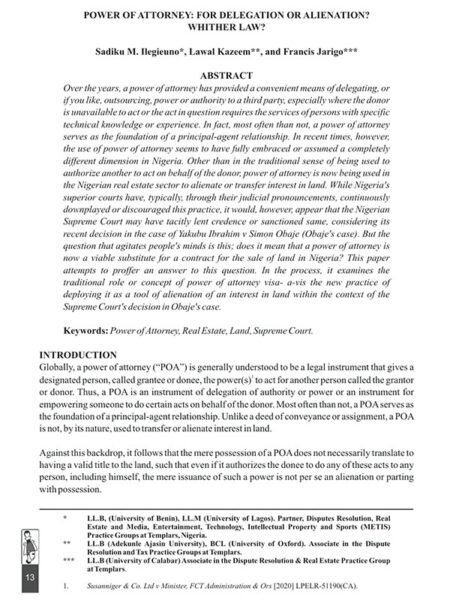
Power of Attorney: For Delegation or Alienation? Whither Law?
0₦2,500.00Sadiku Ilegieuno, Lawal Kazeem and Francis Jarigo, all of Templars, Nigeria, in their article, Power of Attorney: For Delegation or Alienation? Whither Law? note that other than using a power of attorney in the traditional sense to authorize a donee to act on behalf of a donor, power of attorney is now being used in the Nigerian real estate sector to alienate or transfer interest in land. While Nigeria’s superior courts have downplayed or discouraged this practice through their judicial pronouncements, Nigerian Supreme Court may have tacitly lent credence or sanctioned the practice, considering its recent decision in the case of Yakubu Ibrahim v Simon Obaje. Ilegieuno et al. consider whether a power of attorney is now a viable substitute for a contract for the sale of land in Nigeria. They examine the traditional role of the power of attorney vis- a-vis the new practice of deploying it as a tool of alienation of an interest in land within the context of the Supreme Court’s decision in Obaje’s case.
-
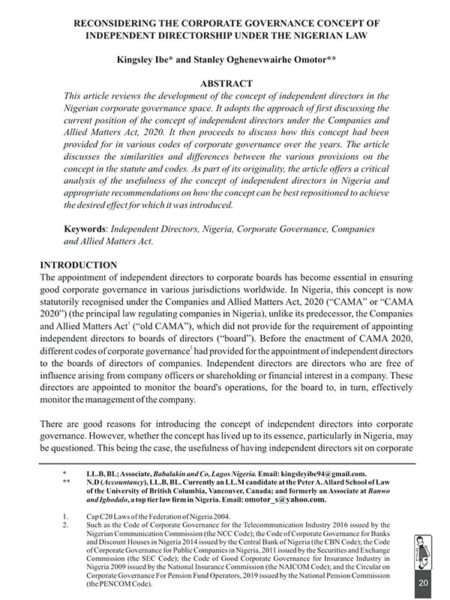
Reconsidering the Corporate Governance Concept of Independent Directorship Under Nigerian Law
0₦2,500.00Kingsley Ibe, Associate at Babalakin & Co and Stanley Omotor, formerly of Banwo and Ighodalo and now an LL.M candidate at the Peter A. Allard School of Law of the University of British Columbia, Canada, in their article, Reconsidering the Corporate Governance Concept of Independent Directorship Under Nigerian Law, note that the concept of independent directorship is now statutorily recognised under the Companies and Allied Matters Act, 2020. Ibe and Omotor review the development of the concept of independent directors in the Nigerian corporate governance space. They examine the regulatory framework for independent directors in Nigeria, the various corporate governance codes, the similarities and differences between the various provisions in the statute and codes. They offer a critical analysis of the usefulness of the concept of independent directors in Nigeria, and recommendations on how the concept can be best repositioned to achieve the desired effect.
-
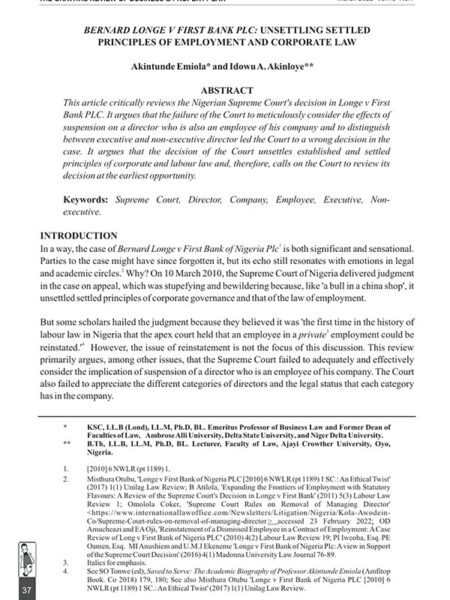
Bernard Longe v First Bank Plc: Unsettling Settled Principles of Employment and Corporate Law
0₦2,500.00Akintunde Emiola, Emeritus Professor of Business Law and Former Dean of Faculties of Law, Ambrose Alli University, Delta State University, and Niger Delta University, and Dr Idowu Akinloye of the Faculty of Law, Ajayi Crowther University, Oyo, Nigeria, in their article, Bernard Longe v First Bank Plc: Unsettling Settled Principles of Employment and Corporate Law, cast a second look at the celebrated Nigerian Supreme Court case. They argue that the failure of the Court to consider the effects of suspension on a director who is also an employee, and to distinguish between an executive and non-executive director led the Court to a wrong decision. Emiola and Akinloye argue that the decision of the Supreme Court unsettles established and settled principles of corporate and labour law and ought to be reviewed at the earliest opportunity.
-
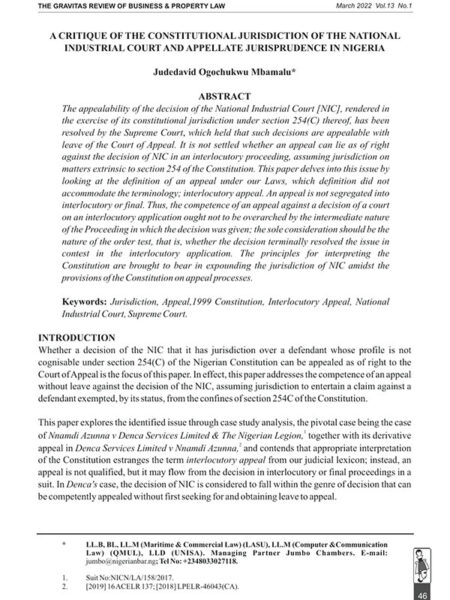
A Critique of the Constitutional Jurisdiction of the National Industrial Court and Appellate Jurisprudence in Nigeria
0₦2,500.00Dr Judedavid Mbamalu, Managing Partner of Jumbo Chambers, in his paper, A Critique of the Constitutional Jurisdiction of the National Industrial Court and Appellate Jurisprudence in Nigeria, argues that while the appealability of the decision of the National Industrial Court (NIC), rendered in the exercise of its jurisdiction under section 254(C) of the 1999 Constitution of Nigeria has been resolved by the Supreme Court, it is not settled whether an appeal can lie as of right against the decision of the NIC in an interlocutory proceeding, assuming jurisdiction on matters extrinsic to section 254. Dr Mbamalu argues that the segregation of appeals into ‘interlocutory’ and ‘final’ is unknown to ‘our Statutes and Rules of Court’, and the competence of an appeal against a decision of a court on an interlocutory application ought not to be overarched by the intermediate nature of the Proceeding in which the decision was given. He elaborates on the principles for interpreting the Constitution in expounding the jurisdiction of the NIC amidst the provisions of the Constitution on appeal processes.
-
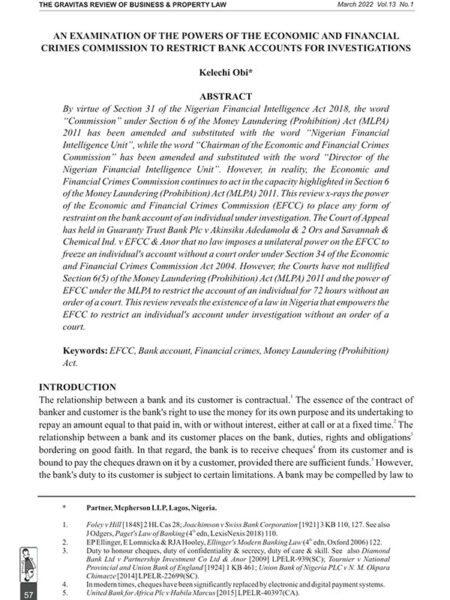
An Examination of the Powers of the Economic and Financial Crimes Commission to Restrict Bank Accounts for Investigations
0₦2,500.00Kelechi Obi, Partner, McPherson LLP, Lagos, Nigeria, in his article, An Examination of the Powers of the Economic and Financial Crimes Commission to Restrict Bank Accounts for Investigations, considers the provisions of the Nigerian Financial Intelligence Act 2018, the Money Laundering (Prohibition) Act 2011 (as amended), the Economic and Financial Crimes Commission Act 2004 in x-raying the powers of the EFCC to place restraint on the bank account of an individual under investigation. Kelechi reviews two crucial decisions of the Court of Appeal on the issue and concludes that there is a law that empowers the EFCC to restrict an individual’s account under investigation without an order of a court.
-
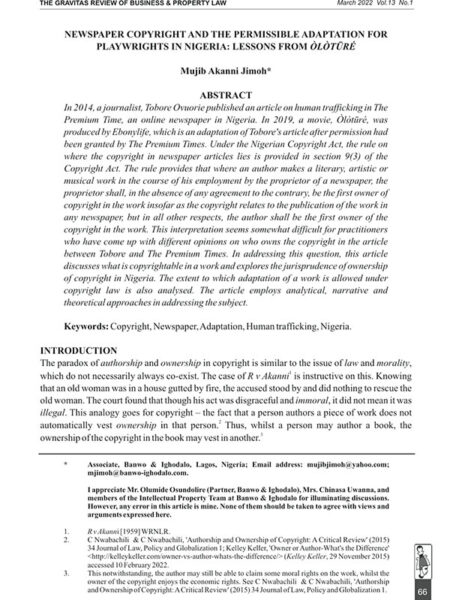
Newspaper Copyright and the Permissible Adaption for Playwrights in Nigeria: Lessons from Òlòtūré
0₦2,500.00Mujib Jimoh, Associate, Banwo & Ighodalo, Lagos, Nigeria, in his article, Newspaper Copyright and the Permissible Adaption for Playwrights in Nigeria: Lessons from Òlòtūré, explains that in 2014, a journalist, Tobore Ovuorie published an article on human trafficking in The Premium Times, an online newspaper in Nigeria. In 2019, a movie, Òlòtūré, which became a Netflix blockbuster, was produced by Ebonylife, which is an adaptation of Tobore’s article after permission had been granted by The Premium Times. Tobore posited that she ought to grant the permission. Under the Nigerian Copyright Act, the rule on where the copyright in newspaper articles lies is provided in section 9(3). There were differing interpretations of section 9(3) by practitioners. In this brilliant article, Mujib dissects the differing claims and interpretations. He discusses what is copyrightable in a work, the jurisprudence of ownership of copyright in Nigeria, and the extent to which adaptation of a work is allowed under copyright law.
-
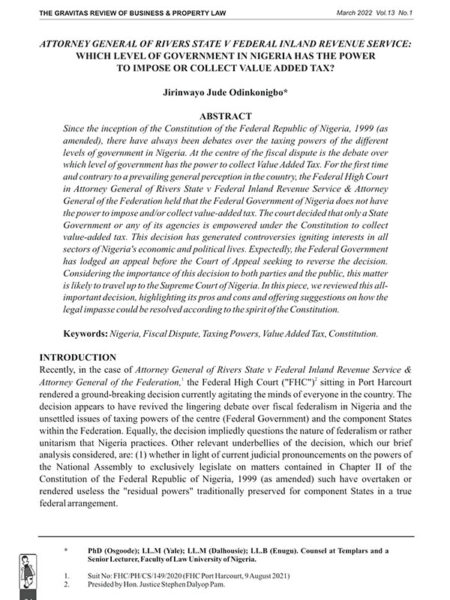
Attorney General of Rivers State v Federal Inland Revenue Service: Which Level of Government in Nigeria Has the Power to Impose or Collect Value Added Tax?
0₦2,500.00Dr Jirinwayo Jude Odinkonigbo of Templars and Faculty of Law University of Nigeria, in his article, Attorney General of Rivers State v Federal Inland Revenue Service: Which Level of Government in Nigeria Has the Power to Impose or Collect Value Added Tax?notes that since the inception of the 1999 Constitution of Nigeria, there have been debates over the taxing powers of the different levels of government, especially with regards to the Value Added Tax (VAT). For the first time and contrary to a prevailing general perception in the country, the Federal High Court in Attorney General of Rivers State v Federal Inland Revenue Service held that the Federal Government does not have the power to impose or collect VAT. The Court decided that only a State Government or its agency is empowered under the Constitution to collect VAT. Dr Odinkonigbo reviews this vital decision, highlighting its pros and cons and offering suggestions on how the legal impasse could be resolved according to the spirit of the Constitution.
-
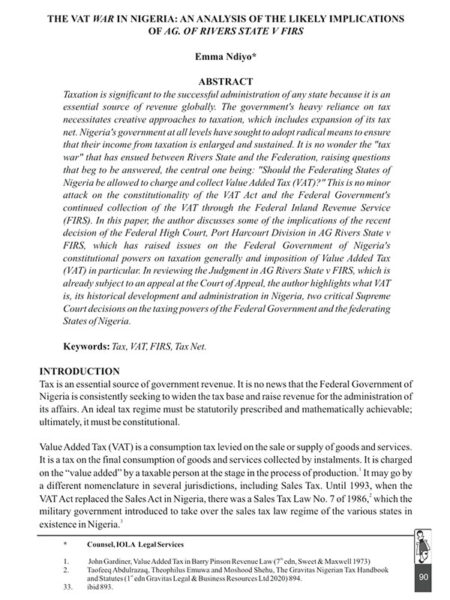
The VAT War in Nigeria: An Analysis of the Likely Implications of AG Rivers State v FIRS
0₦2,500.00Emma Ndiyo, Counsel at IOLA Legal Services, weighs in on the VAT debate in her article, The VAT War in Nigeria: An Analysis of the Likely Implications of AG Rivers State v FIRS. She discusses some of the implications of the recent decision of the Federal High Court in AG Rivers State v FIRS which has raised issues on the Federal Government of Nigeria’s constitutional powers on taxation generally and imposition of Value Added Tax (VAT) in particular. In reviewing AG Rivers State v FIRS, Emma highlights the historical development and administration of VAT in Nigeria. She reviews the Supreme Court decisions in AG Ogun State v Aberuagba and AG Lagos State v Eko Hotels on the taxing powers of the Federal Government and the federating states. She concludes with her thoughts on steps for improved tax administration in the country.
-
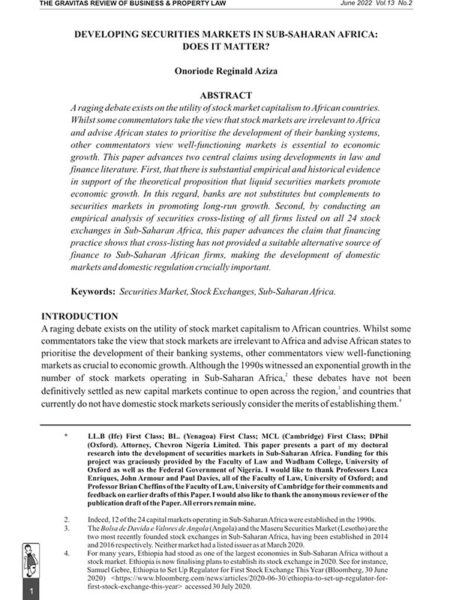
Developing Securities Markets in Sub-Saharan Africa: Does it Matter?
0₦2,500.00Dr Onoriode Aziza of Chevron Nigeria, in his landmark study, Developing Securities Markets in Sub-Saharan Africa: Does it Matter? notes the raging debate on the utility of stock market capitalism to African countries. Whilst some commentators take the view that stock markets are irrelevant to Africa and advise African states to prioritise the development of their banking systems, other commentators view well-functioning markets as essential to economic growth. Dr Aziza advances two central claims using developments in law and finance. First, there is substantial empirical and historical evidence supporting the theoretical proposition that liquid securities markets promote economic growth. In this regard, banks are not substitutes but complement securities markets in promoting long-run growth. Second, by conducting an empirical analysis of securities cross-listing of all firms listed on all 24 stock exchanges in Sub-Saharan Africa, Dr Aziza advances the claim that cross-listing has not provided a suitable alternative source of finance to Sub-Saharan African firms, making the development of domestic markets and regulation crucially important.
-
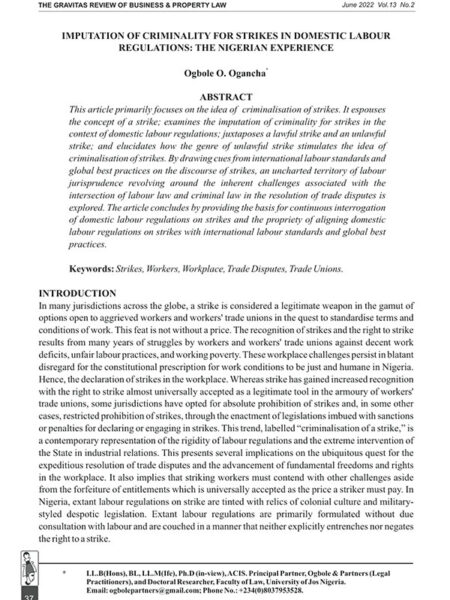
Imputation of Criminality for Strikes in Domestic Labour Regulations: The Nigerian Experience
0₦2,500.00Ogbole Ogancha of Ogbole & Partners, and Doctoral Researcher at the Faculty of Law, University of Jos Nigeria, in his article, Imputation of Criminality for Strikes in Domestic Labour Regulations: The Nigerian Experience, examines the imputation of criminality for strikes in the context of domestic labour regulations. He considers the concept of ‘lawful strikes’ and ‘unlawful strikes’ and argues that ‘unlawful strikes’ stimulate the idea of criminalisation of strikes. Ogancha explores Nigerian laws and regulations on the issue. Drawing cues from international labour standards and global best practices, he concludes that the criminalisation of strikes is not a sufficient or ideal deterrence. A progressive approach lies in the speedy identification of the causes of workers’ discontent.
-
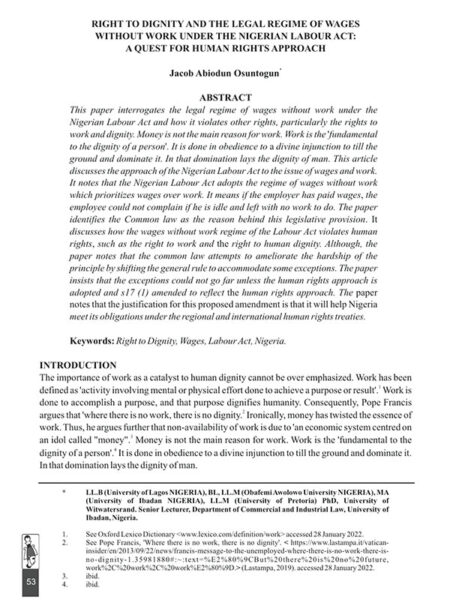
Right to Dignity and the Legal Regime of Wages Without Work Under the Nigerian Labour Act: A Quest for Human Rights Approach
0₦2,500.00Dr Jacob Osuntogun, Senior Lecturer, Department of Commercial and Industrial Law, University of Ibadan Nigeria, in his paper, Right to Dignity and the Legal Regime of Wages Without Work Under the Nigerian Labour Act: A Quest for Human Rights Approach, interrogates the legal regime of wages without work under the Nigerian Labour Act and how it violates other rights, particularly the rights to work and dignity. He argues that ‘money is not the main reason for work’ and work is fundamental to a person’s dignity. Dr Osuntogun notes that the Nigerian Labour Act prioritises the payment of wages. If the employer has paid wages, the employee could not complain if he is idle and left with no work to do. He argues that the wages without work regime of the Labour Act violates human rights and advocates an amendment of the Labour Act for Nigeria to meet its obligations under regional and international human rights treaties.
The Gravitas Review of Business & Property Law



